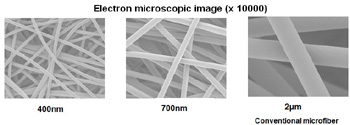Jan 16 2012
Teijin Fibers Limited, the core company of the Teijin Group's polyester fibers business, announced today that it has decided to commercialize a new version of its Nanofront high-strength polyester nanofiber with a diameter of 400 nanometers, or 22,500 times smaller than the cross-sectional area of a strand of hair, an unprecedented achievement for a commercial polyester fiber.

The new version, which will be marketed by Teijin Fibers as a finer version of its existing 700-nanometer Nanofront nanofiber, will expand the market for the company's versatile, high-performance nanofiber by meeting demands for even finer nanofibers in applications, such as high-performance air filters that trap especially fine dust particles while allowing increased air flow in compact, energy-efficient air conditioning systems.
Teijin Fibers introduced the world's first commercial polyester nanofiber in 2008. The 700-nanometer version of Nanofront is 7,500 times smaller than the cross section of a hair strand and boasts more than 200 related patent applications.
Nano-sized bumps on the surface of Nanofront raise frictional force and produce a surface area dozens of times greater than that of regular fiber, giving the material outstanding slip resistance. The ultra-fine fiber is also soft, stretchable, fits body contours comfortably, promotes cooling and boasts excellent absorbency and opaqueness. Nanofront is used in a wide variety of clothing and industrial applications, ranging from inner-wear, golf gloves and skin care products to abrasive cloth and filters.
Teijin Fibers has already established the mass-production technology for even finer nanofiber, as small as 280 nanometers in diameter, which it aims to commercialize eventually.
Going forward, Teijin Fibers will continue leveraging its competitive nanotechnologies in nanofibers that incorporate functional polymers, such as polyethylene naphthalate (PEN), olefin-based polymers, nylon, and polytrimethylene terephthalate (PTT). Applications in areas such as electronic components, industrial filters, clothing and bedding are expected to meet increasingly stringent demands in terms of usage and functional properties.